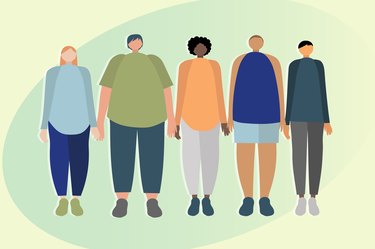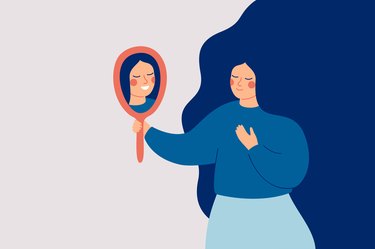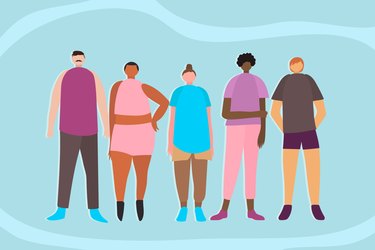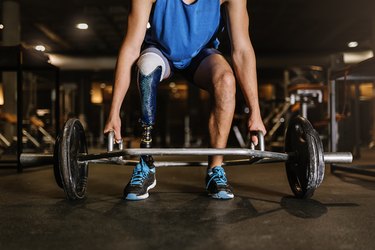
Fatphobia. Anti-fat bias. Anti-fatness. Sizeism. Weight bias. These are different terms, but they have one thing in common: They all focus on weight stigma, the discriminatory acts and beliefs targeted at people who have overweight or obesity.
You may hear fatphobia most often, but terms that include the word fat tend to generate controversy.
Video of the Day
Video of the Day
"I personally prefer the term weight bias," says Fatima Cody Stanford, MD, MPH, an obesity medicine physician at Massachusetts General Hospital and Harvard Medical School in Boston, whose campaign led the American Medical Association (AMA) to remove all references about fat from its website and literature in 2017. Studies have shown that in health care settings, "The word fat itself is very inflammatory."
Indeed, terms like fatphobia are controversial because they can imply that anti-fat discrimination is the result of a phobia — an uncontrollable or unintentional fearful mental state — when they're actually learned (and often conscious) beliefs and behaviors, wrote fat activist Aubrey Gordon in March 2021 for Self.
With that in mind, here's everything you need to know about weight bias, including its history, downstream effects and how you can fight discriminatory behavior, no matter your size.
What Is Weight Bias?
Weight bias (or what many people think of as "fatphobia") perpetuates the belief that people who have overweight or obesity are lazy, lack will power and even have low levels of intelligence, Dr. Stanford says.
And weight bias is more than just a term. The concept is so engrained in our culture that weight discrimination is baked into the infrastructure of society — for example, seating in cinemas or airlines that's not designed to accommodate people with larger bodies, clothing that doesn't fit certain people and, in the medical field, gowns and exam tables that aren't accessible to people of all sizes.
"It's all so dehumanizing, and it endangers both the physical and mental health of those who [have] overweight or [obesity]," Dr. Stanford says.
The History of Weight Bias
Weight bias is a relatively new cultural phenomenon: Just 200 years ago, excess weight was a sign of affluence, Dr. Stanford says. (It's no accident that artists Rembrandt and Rubens portrayed the ideal woman as voluptuous and round.)
But that began to change in the middle of the 18th century during the rise of the slave trade, when colonizing Europeans weaponized size and skin color against Africans by claiming that a slender, white body is indicative of self-control and, thus, racial superiority, Sabrina Strings, PhD, a sociologist at the University of California, Irvine, told NPR in July 2020. In fact, weight bias and racism remain deeply intertwined to this day.
This changing physical ideal was reinforced again when, in the 1890s, American artist Charles Dana Gibson first drew images of tall, slim-waisted women — what came to be referred to as the "Gibson Girl."
The rise of the 1920s flapper further reflected this shift toward a new ideal body type, which was eventually solidified with the rise of the waif-thin model Twiggy in the 1960s, Dr. Stanford says.
"We really saw models like Twiggy lauded for how small and lean they were, and it became a sign of beauty," she says. "Today, we see more weight bias in high-income countries like the U.S., as opposed to low-income countries where a high weight is seen as a sign of wealth."
Pushback against weight bias likewise emerged in the late 1960s, when self-identified fat Black women championed the body positivity movement to create a safe space for marginalized bodies, per The Ohio State University.
In 1969, writer Lew Louderbach published an article in the Saturday Evening Post about America's anti-fat culture, according to the National Association to Advance Fat Acceptance (NAAFA). Later that year, he and a group of like-minded individuals founded the National Association to Aid Fat Americans (today, the NAAFA).
The 1970s saw the creation of the Fat Underground, which declared diet culture the enemy and demanded "equal rights for fat people in all areas of life," according to the NAAFA.
By the 1990s, fat activists were protesting in front of the White House and speaking out on Internet message boards and chat rooms. As social media spread, a new generation of tech-savvy Instagrammers were spreading the messages of body positivity and neutrality.
For instance, Black influencers and advocates — such as Leah Vernon and Stephanie Yeboah — have pushed the discourse around body politics throughout the decades to encompass the intersection of race, gender, size and white privilege, according to a chapter in Pluralistic Struggles in Gender, Sexuality and Coloniality published online in September 2020.
And in June 2013, the AMA voted to recognize obesity as a disease requiring treatment and prevention efforts.
"This was critical in promoting inclusivity and fighting weight bias, because it recognized that obesity is not always attributable to eating too many calories," Dr. Stanford says. "People with obesity have impaired metabolic pathways, and their brains send out disordered signaling for hunger and fullness. That's why it's not as simple as just telling patients to watch what they eat and exercise."
The Effects of Weight Bias
Still, just because fat activists have been hard at work for more than half a decade doesn't mean that weight bias isn't still alive and well. Here are just some of the ways weight discrimination plays out in everyday life:
1. It Can Lead to Dismissive Medical Care or Discourage People From Seeking Care in the First Place
People with obesity often face severe stigmatization from doctors, which discourages them from getting help, Dr. Stanford says.
"In medical school, we're taught about calories, diet and exercise, but we're not taught anything about how the brain regulates weight and the different brain pathways that regulate food intake," Dr. Stanford says. "As a result, most doctors still view obesity as a lifestyle choice — something that happens because patients are 'lazy' and haven't 'tried hard enough.' But the truth is, obesity is a disease."
Because of this assumption, doctors can place blame on people for not losing weight to take charge of their health (when, in reality, people's symptoms may have nothing to do with their weight). This in turn can prompt people to blame themselves for their ills, thereby perpetuating a vicious cycle that creates even more bias and stigma.
"It's heartbreaking that people with very severe obesity often don't seek out medical care because they worry that their doctor will just put blame on them and make them feel even worse," Dr. Stanford says.
And weight bias in health care can be deadly. Case in point: A February 2019 article in JAMA recounts the story of Ellen Maud Bennett, a 64-year-old costume designer who died of advanced cancer in May 2018. Her symptoms were brushed off for years by doctors who blamed them on her weight.
Her dying wish, according to her obituary? "That women of size make [their deaths] matter by advocating strongly for their health and not accepting that fat is the only relevant health issue."
Tip
Specifically searching for a size-inclusive medical provider may help you access better care if you feel dismissed by your current doctor.
2. It Can Encourage Dangerous Eating Behaviors
Weight bias is also present in another important area: Nutrition, says Colleen Tewksbury, PhD, MPH, RDN, a spokesperson for the Academy of Nutrition and Dietetics and a senior research investigator at the Perelman School of Medicine at the University of Pennsylvania.
An August 2021 study in the International Journal of Environmental Research and Public Health surveyed over 600 dietitians and nutrition students and found that many displayed weight bias.
"It's concerning, because if patients with obesity are exposed to this, then they may avoid nutrition counseling entirely and engage in unhealthy eating behaviors like severe food restriction and/or binge eating," Tewksbury says.
That's one reason why Dr. Stanford lobbied the AMA to adopt a resolution in 2017 that endorsed the use of person-first language (such as "people with obesity" or "people affected by obesity" rather than "obese people").
The resolution also urged providers to avoid using stigmatizing terms such as "unhealthy weight," "obese," "morbidly obese" and "fat," and vowed to educate health care providers on the importance of equipping their health care facilities with properly sized furniture, medical equipment and gowns for people of all sizes.
"Even if you move through the world with thin privilege, you can advocate for the exact same accommodations to be available to everyone."
How to Be an Ally
The fight against weight bias is ongoing. Here's how you can participate:
1. Call Out Weight Bias
You may swear by your favorite clothing store or restaurant, but if they don't carry plus-size options or offer accessible seating, let them know that you don't agree with it, says Lore McSpadden-Walker, a fitness trainer and founder of the Positive Force Movement.
"Even if you move through the world with thin privilege — you can find clothing that fits you in stores and can comfortably sit in an airplane seat — you can advocate for the exact same accommodations to be available to everyone," they say.
2. Question Your Own Bias
Chances are you have weight bias, even if you don't realize it, Dr. Stanford says — after all, it's hard not to internalize a concept you've encountered throughout your entire life, regardless of your size.
For instance, if you look in a mirror and think that your arms look fat or feel upset about your love handles, take time to think about why, McSpadden-Walker says.
"It doesn't work to just try to push those feelings away," they say. "You want to explore why you feel so critical: Is it because you fear aging? Do you have other areas of life where you don't feel empowered?"
It's hard work, but it's the only way you can push through and ultimately conquer your own "fatphobia" or anti-fat bias.
How to Start Confronting Your Own Weight Bias
Dr. Stanford recommends that everyone take the Weight Implicit Association Test (W-IAT), an online test that often reveals an automatic preference for people with thinner bodies (it requires you to be able to distinguish between the faces of people with obesity and people who are thin).
“It’s very important because a lot of people think they don’t have weight bias, but when they take the test they realize their thoughts and beliefs about people who have obesity,” she says. “Research shows that children start to exhibit bias [against] people with obesity as early as 3 years of age. You need to work on yourself before you can begin to work on others.”
3. Watch Your Language
"I was so bad at dinner last night."
"I need to go to the gym to work off the weekend."
"You look so amazing. Did you lose weight?"
If you've said any of those or similar phrases, you've sent a clear message to family, friends and co-workers with obesity: I am doing my very best not to be like you.
"It can be something as simple as watching TV with others and commenting that a lean individual looks gorgeous in that dress," Dr. Stanford says. "If you're a person with obesity, the unspoken message is that you're not valued or desired."
4. Tweak Your Media Habits
If you've ever used a photo-editing app to slim you down for an Instagram photo or posted proud pictures of your six-pack abs in a bikini, then you're promoting weight bias, McSpadden-Walker says.
Instead, follow fat-positive influencers (such as Lizzo or Megan Jayne Crabbe) to help you feel more comfortable with the physicality of people with obesity.
McSpadden-Walker also recommends two books to help you become aware of and unlearn weight bias: Fat-Talk Nation by Susan Greenhalgh and The Body Is Not an Apology by Sonya Renee Taylor.
- American Medical Association: "Recognition of Obesity as a Disease H-440.842"
- JAMA: "Addressing Medicine’s Bias Against Patients Who Are Overweight"
- International Journal of Environmental Research and Public Health: "Do Registered Dietitians, Nutrition Students, and Laypeople Perceive Individuals with Obesity Differently?"
- American Medical Association: "Person-First Language for Obesity"
- Library of Congress: "The Gibson Girl’s America: Drawings by Charles Dana Gibson"
- National Association to Advance Fat Acceptance: "NAAFA’s Orgin Story & Fat Activism History"
- Pluralistic Struggles in Gender, Sexuality and Coloniality: "Fat, Black and Unapologetic: Body Positive Activism Beyond White, Neoliberal Rights Discourses"
- The Ohio State University: "The Whitewashed, Diluted Reality of Modern Body Positivity: The Important Black History of the Body Positivity Movement"
- Self: "I’m a Fat Activist. I Don’t Use the Word Fatphobia. Here’s Why"
- NPR: "Fat Phobia And Its Racist Past And Present"
- Journal of Applied Developmental Psychology: "Thin is good, fat is bad: How early does it begin?"
- Harvard Health Publishing: "Addressing weight bias in medicine"
- ACP Internist: "Doctor, your weight bias is showing"


